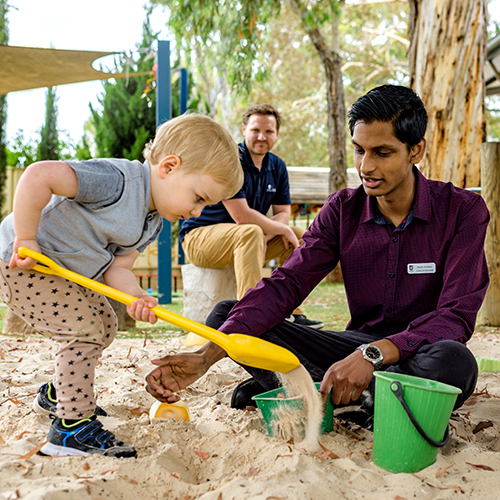29 January 2024
 Education experts at the University of South Australia are calling for a national childhood workforce strategy to encourage more men into early learning and childcare professions.
Education experts at the University of South Australia are calling for a national childhood workforce strategy to encourage more men into early learning and childcare professions.
The call is part of the newly launched Minderoo Thrive by Five Dad’s Alliance Action Plan for the Early Years, which aims to support fathers to take a more active role in their children’s lives.
With fewer than 3% of men in carer and teacher roles in the early childhood education and care sector, the need for gender diversity is clear, says UniSA’s Dr Martyn Mills-Bayne.
“The first five years of a child’s life are critical to healthy development, and it’s vital that children receive the best quality of care during these early years,” Dr Mills-Bayne says.
“A key part of this is ensuring that children are cared for by healthy and positive role models – which includes both men and women.
“Yet in childcare and early education settings, men are vastly underrepresented. And this can be to the detriment of children. Having access to positive interactions between men and women supports young children’s healthy development in all areas.
“Centre-based care is highly regulated to ensure quality education and care is provided for all children who attend.
“What is missing however, is the access to a gender diverse early childhood workforce where young children have opportunities to experience rich relationships with male educators, and the day-to-day interactions between men, women, and non-binary educators that they might otherwise miss out on.
“The early years are critical to children’s healthy growth in all areas of development, and a diverse gender profile in the early years’ workforce adds to the rich potential for children to see themselves reflected in the adults who educate and care for them in structured early learning.”
The lack of male teachers and carers in early childhood education is a challenge globally with men comprising only 4% of the early childhood education and care workforce in OECD countries. It’s a growing issue that adds to Australia’s national teacher shortage.
Dr Mills-Bayne says we need to do more to encourage men into early learning and childcare positions.
“Young children can benefit enormously from male teachers and carers in early childhood settings.” Dr Mills-Bayne says.
“Not only can men often provide increased opportunities for children to engage in ‘rough-and-tumble’ play, or to get involved in messy play and take risks, but they also represent much-needed healthy and caring role models.
“When young children learn from and are cared for by both men and women, we’re showing that all genders matter, so that ‘caring’ and ‘being kind’ are valued across genders. And this important learning is something they’ll take with them across their lives.
“Breaking long-established gender stereotypes is vital and it needs to be more strongly supported in early childcare and education.
“We are calling on state and national governments to join the Dad’s Action Plan for the Early Years to help supercharge male involvement in young children’s lives with a radical shift in the recruitment and retention of male early childhood educators.
“If we can improve the experiences of our youngest citizens so that they’re cared for by men and women, the flow on effects could be exponential – it’s time to step up.”
Notes to editors:
UniSA provides tailored support for males studying Early Childhood Education programs: UniSA’s MENtor Program for Males in Early Childhood Education is an award-winning initiative that helps build professional and social networks between male UniSA students currently studying in Early Childhood Education programs and male educators working in a range of educational settings in South Australia and beyond. It is coordinated by Dr Martyn Mills-Bayne who is a lecturer in Early Childhood Education.
…………………………………………………………………………………………………………………..
Media contact: Annabel Mansfield M: +61 479 182 489 E: Annabel.mansfield@unisa.edu.au
Researcher: Dr Martyn Mills-Bayne E: Martyn.Mills-Bayne@unisa.edu.au



